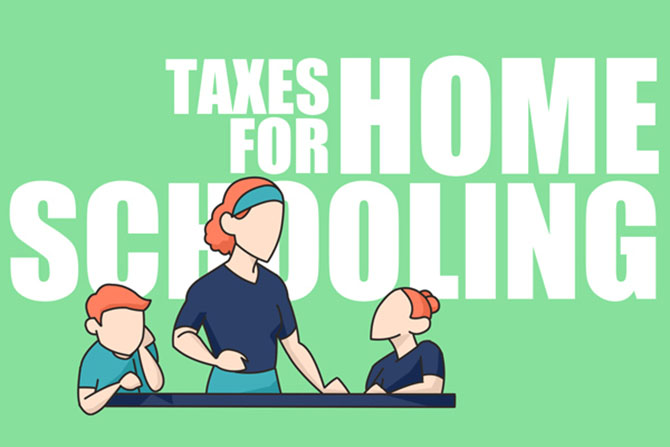Education Tax Credits, Tax Deductions and Homeschooling
by Susannah McQuitty

You got this—all you have to do is start!
We make filing taxes delightfully simple with one, flat–rate price. Every feature included for everyone.
Start filing
Updated August 3, 2020
Is homeschooling a good alternative for public school during the chaos of Coronavirus? It’s a question on many parents’ minds for the last few weeks, and with August upon us, the time for decisions has arrived.
Of course, there are many considerations to make: Can you or your spouse make time to school the kids? Do you have the psychological and emotional capacity to commit to the daily regimen? Will you need a tutor? And what about these homeschooling pods everyone seems to be talking about?
We can’t weigh in on all those subjects, but we can shed some light on the tax side of things. Here’s how taxes work for homeschooling families so you can make the best decision for your family.
Are there tax breaks for homeschooling?
The short answer is no, not at the federal level. That may change in the future, given the pandemic situation and the necessity (or at least probability) of homeschooling for many Americans, but there have not been high-level discussions on that point.
There are exceptions at the state level, however. Several states have tax breaks that are either designed for homeschoolers or are available for homeschoolers to use:
- Illinois has the Education Expense Credit, which is worth 25% of your expenses greater than $250 and is limited to $750.
- Indiana provides a $1,000 education deduction that some homeschool parents of elementary or high school age children homeschooled may qualify for.
- Louisiana’s School Expense Deduction is for 50% of your actual costs per child, worth up to $5,000.
- Minnesota has the K-12 Education Subtraction and Credit. The subtraction works like an expense deduction and is worth up to $1,625 per qualifying child in grades K–6, and $2,500 for a qualifying child in grades 7–12; the credit, on the other hand, reduces your taxes owed, limited at 75% of your expenses, and there is an income cap.
Can I deduct Scholarship Tuition Organization (STO) contributions or curriculum donations?
When it comes to donations, deductions for your monetary contributions or the value of donated goods works the same as any other charitable donations.
Some STOs award scholarships to homeschoolers, so you may donate periodically in the best interest of students applying for financial aid. If your STO is a certified 501(c)(3) charitable organization, you can deduct your contributions at the end of the year (provided you choose to itemize deductions). It’s not a great financing plan, as contributions don’t guarantee a scholarship, but it’s one way you can potentially support homeschooling and get a tax write-off.
Donating used curricula to a non-profit, such as your local library, can also get a deduction for the worth of the curriculum if you are able to itemize deductions. You’ll have to figure the value of the donated items and collect receipts to take the deduction, but it’s a simple way to clean out your school closet and get some tax relief while you’re at it.
What if I’m paid to teach homeschoolers?
Sometimes, you may offer a class for other households to join for a fee, start a homeschool pod, or charge to tutor kids other than your own. In that case, if you’re operating for profit, you could deduct work-related expenses on a Schedule C as a self-employed person.
Be careful here, though—any materials that your kids use don’t count as work-related expenses, since that is for the personal use of your own family. If you buy five textbooks for a class and your child uses one, you can only deduct four as business-related expenses.
Will Congress consider changing the law to allow use of 529 savings for homeschool expenses?
The recently passed SECURE Act initially included a proposal to expand the use of 529 funds for homeschooling expenses, but that proposal didn’t make it into the final bill. Considering the impact the Covid-19 pandemic is having on in-person schooling for elementary and secondary education, elected officials will likely be evaluating the associated costs for virtual schooling and homeschooling and ways to help parents manage those costs.
1040.com makes taxes easy, no matter your situation
We’ll keep you in the know with more updates on education options and how they affect your taxes when you subscribe to the blog—in the meantime, be sure to check out our Coronavirus News and Resources page for other tax-related pandemic news and resources.
Updated August 3, 2020
Sign up for more of this.
Subscribe to our blog for year–round finance strategies and tax tips. We’re here to remove the dread from filing taxes.











